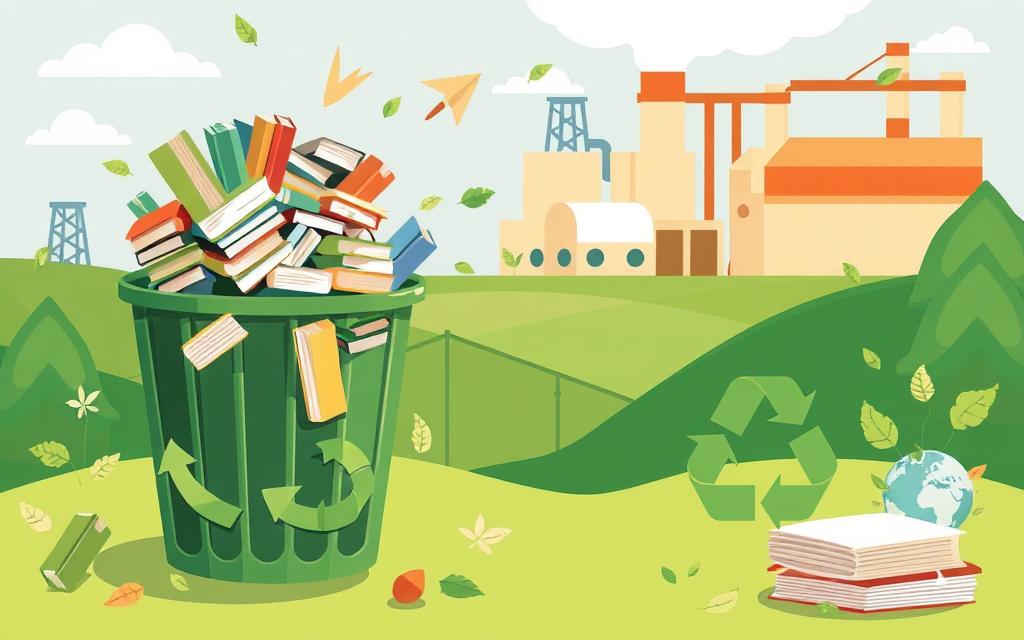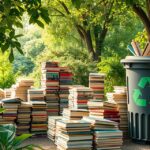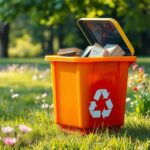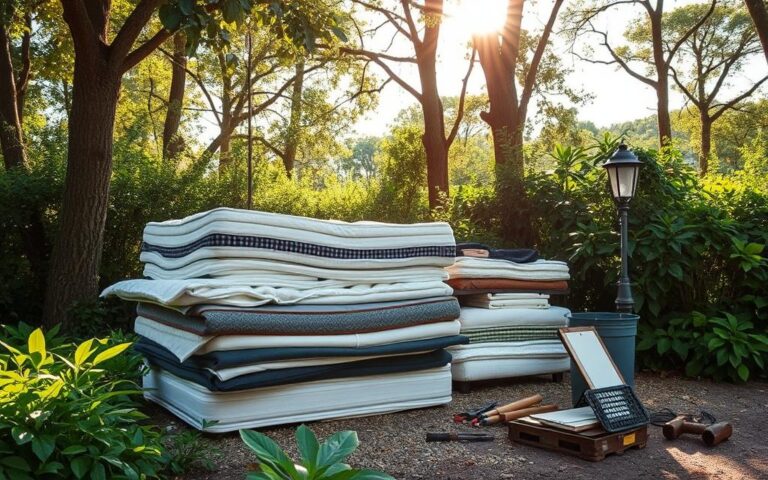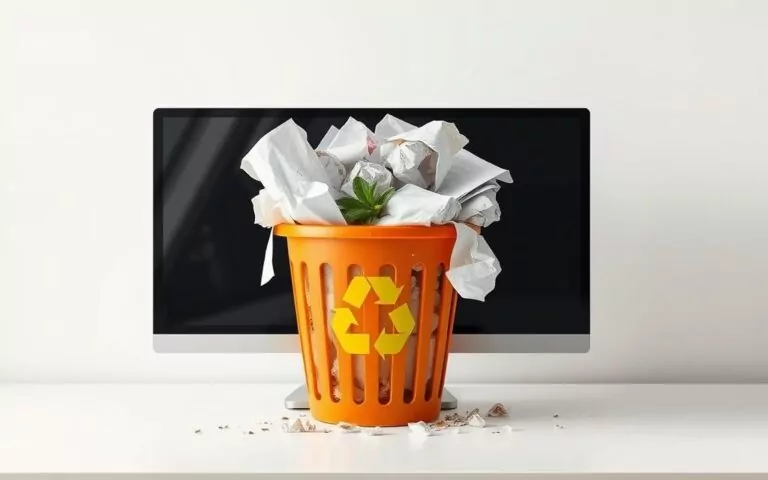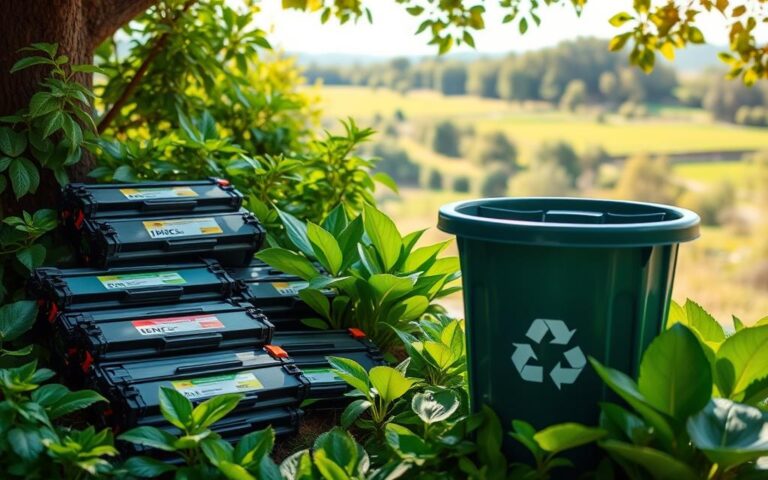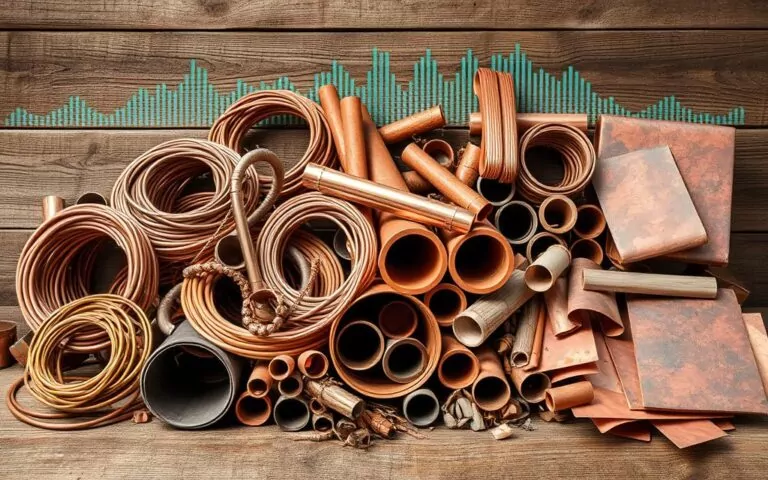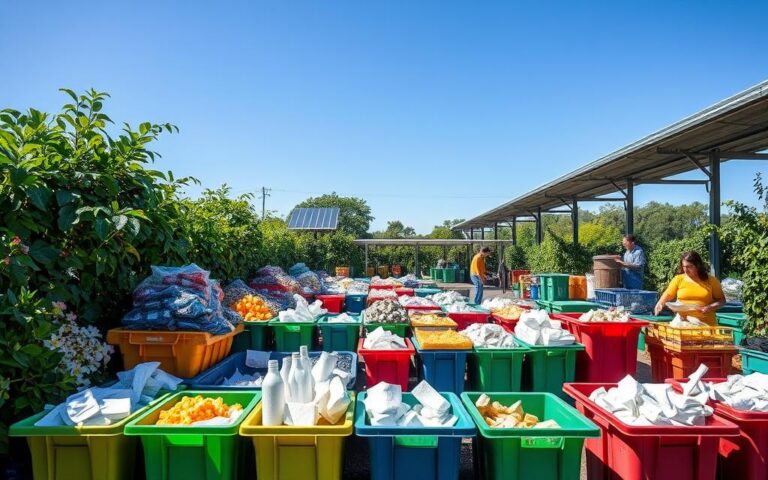Can You Put Books in the Recycling Bin? Proper Disposal Guide
We’re becoming more aware of our impact on the environment, raising questions about recycling books. Maybe you have a pile of novels you no longer read or textbooks that are out of date. Knowing the correct way to get rid of old books is key. Doing this the right way helps our world. Around 33% of new paper comes from recycled stuff. This shows why eco-friendly book recycling is important. It helps save trees and cuts down on waste.
Many people question if it’s okay to just throw books into the recycling bin. This guide will clear up book recycling guidelines for you. It also looks at other ways to handle books you don’t need anymore. Let’s get into how recycling books works and what to keep in mind.
Understanding the Recycling Process
Recycling is key in managing waste and saving natural resources. One important part is recycling paper. This reduces landfill use and helps save trees. Every year, millions of books and papers are thrown away. This shows why recycling is so necessary.
The Importance of Recycling Paper
Recycling paper cuts environmental harm. In 2018, paper waste was about 23.1% of the U.S.’s total waste. Recycling a ton of paper saves 17 trees, 380 gallons of oil, and 7,000 gallons of water. These facts highlight how crucial recycling paper is for our planet.
How the Recycling Process Works
The recycling journey starts with collecting recyclable items like books and newspapers. These items then get sorted at facilities. They separate materials like cardboard and paper. The next step turns paper into pulp, which might get colored for specific uses. This pulp makes new paper, showing recycling’s value.
Different Categories of Recyclables
It’s important to know what you can recycle. There are main categories:
- Paper: newspapers, magazines, and mixed paper.
- Plastics: bottles and containers, marked by recycling codes.
- Metals: aluminium cans and tin cans.
- Glass: bottles and jars, recyclable if clean and not broken.
Understanding what to recycle helps avoid mistakes. It’s vital to not recycle things like glossy paper in many programs. This keeps recycling effective.
| Category | Examples | Notes |
|---|---|---|
| Paper | Newspapers, Mixed Paper | Avoid glossy paper, check local guidelines |
| Plastics | Bottles, Containers | Use recycling codes to identify recyclables |
| Metals | Aluminium Cans, Tin Cans | Rinse to remove food residues |
| Glass | Bottles, Jars | Must be clean and intact |
Can You Put Books in the Recycling Bin?
Discussing how to throw away books, we need to know which ones can be recycled. Most books are mixed paper but not all can be recycled. It’s important to know what types of books your recycling program accepts.
Types of Books Accepted for Recycling
Paperback books can often go straight into the recycling bin. They are simpler to recycle because of their materials. But, hardcover books are more complicated. Their covers and any glue must be taken off as they can mess up the recycling process. Check local guidelines on recycling books. Some places let schools or groups use old books for arts and crafts.
Items to Remove Before Recycling
For books to be recycled properly, take certain things off them first. You should remove:
- Plastic covers
- Sticky labels or tape
- Any non-paper attachments or embellishments
Doing this makes recycling better and keeps the paper stream clean. If you’re not sure about the rules in your area, ask your local recycling service.
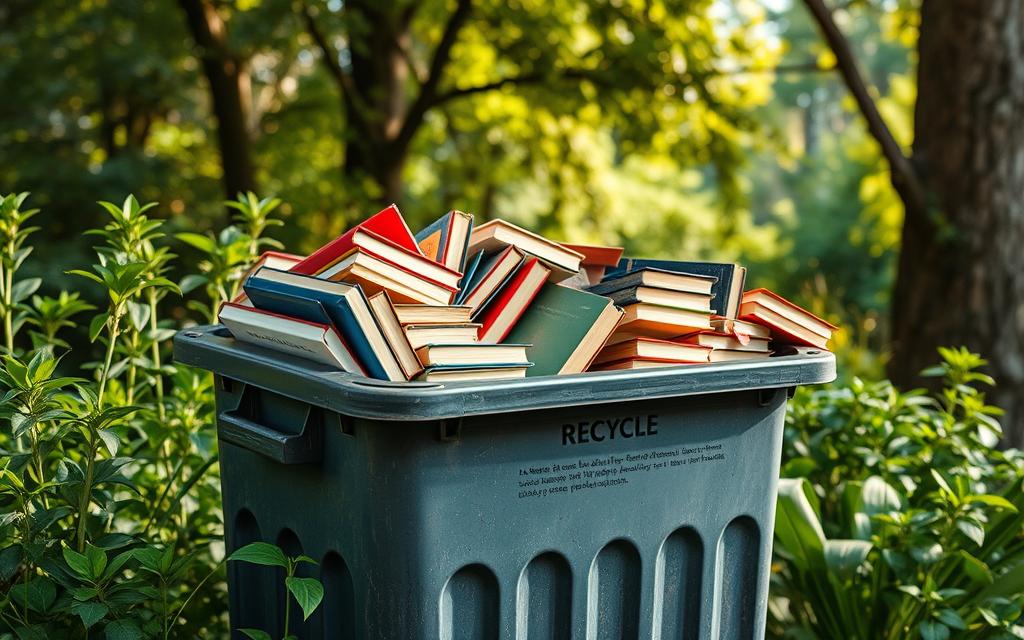
Alternative Methods for Book Disposal
There are many eco-friendly ways to get rid of old books. You can donate or sell them to help with sustainability and support reading programs. Turning books into creative projects is also a fantastic reuse option.
Donating Your Old Books
Donating books is a great way to help others. Charities, libraries, and thrift stores often need gently used books. Better World Books has kept over 250 million books out of landfills, helping with literacy and education.
Reselling Books for Cash
Selling books is another eco-friendly disposal method. Use online sites like BookScouter and eBay to sell your old books and make some money. Textbook Recycle helps keep textbooks out of landfills by reusing or recycling them. Students can sell their books on campus, making it a win-win for everyone.
Upcycling Old Books into New Creations
Upcycling books is fun for crafty people. You can turn a book into something new, like a planter or an iPod dock. Artists like Rich Neeley show us that old books can have new uses.
Environmental Impact of Recycling Books
Improper disposal of books has a big environmental impact. Recycling books is a sustainable choice that helps our planet. It decreases waste in landfills and saves resources, convincing more people and groups to recycle books properly.
Benefits of Recycling vs. Landfilling
Recycling books means less waste in landfills. In 2018, the United States threw away nearly 700,000 tons of books. But less than half of all paper products were recycled. Recycling helps lower the amounts of waste and pollution, making our environment healthier.
Saving Natural Resources through Recycling
Recycling helps save important natural resources. The Earth Protection Agency says recycling paper books is better than throwing them away. Recycling one ton of paper can save a lot of trees and water. It helps us use less new materials and supports local libraries too.
Conclusion
Book recycling is a key part of responsible waste handling we should not ignore. Knowing how to properly dispose of books helps us make better choices about our old ones. Keep in mind, books that are wet or too damaged might not be fit for recycling and belong in the bin instead.
We can give books a new life in eco-friendly ways, helping our community. Giving books to libraries, schools, or shelters helps people in need and encourages reading. Selling books online or in community exchanges helps reuse resources and lowers our carbon footprint.
By finding different ways to deal with unwanted books, we support sustainability. Whether we donate, sell, or upcycle, we play a part in the circular economy. This way, our passion for reading contributes to protecting the environment, not harming it.
FAQ
Can I put all types of books in the recycling bin?
You can recycle most paperbacks without doing anything special because they’re just mixed paper. But, you must take the covers off hardbacks before recycling. Always check your local rules first.
What should I remove from books before recycling?
Take away any plastic covers, sticky stuff, or non-paper bits before recycling. Don’t recycle books that are damaged or wet.
What are the eco-friendly alternatives to recycling books?
Instead of throwing them away, you could donate books to charities, libraries, or second-hand shops. You can also sell them on BookScouter or eBay. Or get creative and turn them into art or decor!
How does recycling books benefit the environment?
Recycling reduces the need for landfill space, saves trees and water, and uses less energy. Recycling a ton of paper makes a big difference in protecting our planet.
Are there specific recycling guidelines I should follow for books?
Yes, you should look up your local recycling rules. Make sure the books are clean and dry. Remove any parts that aren’t paper. Then, put them in the right bin for mixed paper.
What happens to books once they are recycled?
Recycled books are sorted with other papers and turned into new paper. This process helps us use fewer new resources and supports a sustainable economy.

